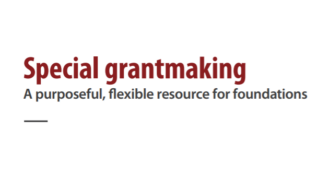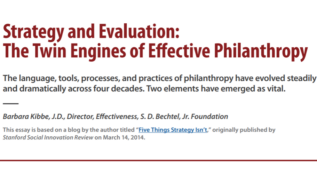
Foundation strategy encompasses the philosophical and practical considerations of a family’s philanthropy. What values does the family share, and how do they translate those values into their giving? How do the staff and board make the choices needed to develop a strategy that achieves impact and reflects the family’s vision?
Start by reviewing NCFP’s Family Giving Lifecycle Primer, Impact Strategies & Tools, and see below for additional guidance.
Strategy Planning


Special grantmaking: A purposeful, flexible resource for foundations
Article
Strategy and Evaluation: The Twin Engines of Effective Philanthropy
ArticleStrategic Planning
Many foundations develop or reassess their strategy through a strategic planning process. Below are sample strategic plan that show a wide range of planning processes and outcomes.
- Strategic Framework 2019 to 2021 (McKnight Fdn)
- Strategic Plan (Ahrens Foundation, 2017 2019)
- Family Foundation Strategic Plan Template (NCFP, 2017)
- Strategic Plan (Overbrook Foundation, 2016)
- Strategic Framework (Wilburforce Fdn, 2014 to 2025)
More example strategic plans can be found here. Another useful resource for those looking to engage an outside voice in this process is Hiring a Strategic Planning Consultant.
Case Studies
These case studies illustrate how families have developed and changed their philanthropic strategies:
Other Related Content Collections
In addition to the above resources, NCFP’s Knowledge Center features a variety of other Content Collections which inform the practice of strategic philanthropy. These include:
